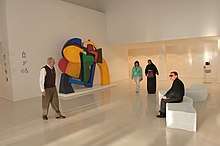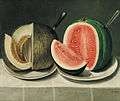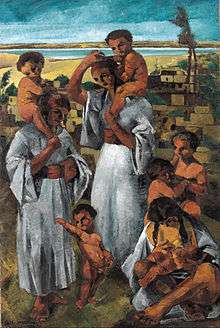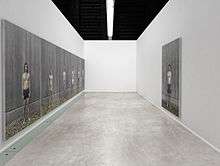Mathaf: Arab Museum of Modern Art
The Mathaf: Arab Museum of Modern Art (متحف : المتحف العربي للفن الحديث) in Doha offers an Arab perspective on modern and contemporary art and supports creativity, promotes dialogue and inspires new ideas. Established in 2010, it is considered to be among the most important cultural attractions in the country.[1]
History

Mathaf opened in December 2010 in a temporary building in the Qatar Foundation's Education City in Doha, transformed by the French architect Jean-François Bodin.[2] Mathaf (متحف in Arabic) translates to "museum".[3] The initial collection was gathered by Sheikh Hassan bin Mohammed Al Thani, and QMA provided the conditions of conservation as a public institution chaired by Sheikha Al-Mayassa Al Thani.[4]
Collection
The 5,500-square-meter (59,000-square-foot) museum, located in a former school building in Doha’s Education City, has a collection of more than 9,000 artworks, as communicated in 2014, that offers a rare comprehensive overview of modern Arab art, representing the major trends spanning from the 1840s to the present. The collection was donated by Sheikh Hassan bin Mohamed bin Ali Al Thani to Qatar Foundation, and was later acquired by Qatar Museums Authority.[5] It is thought to be one of the largest collections of Arab-produced paintings and sculptures in the world.[6] Qatar Museums Authority chairwoman, Sheikha Al-Mayassa Al Thani, stated upon the opening of Mathaf in 2010 that, "[...] we are making Qatar the place to see, explore and discuss the creations of Arab artists of the modern era and of our own time."[7]
Exhibitions
Mathaf permanent collection exhibition occupies seven galleries in the upper floor, while the atrium and five galleries are dedicated to temporary exhibitions. The museum looks at major modern and contemporary movements represented in the collection. Mathaf opened on 30 December 2010 with an exhibition called Sajjil, which means "act of recording" in Arabic, and featured a cross-section of Arab art over the previous 100 years. Simultaneously, the museum hosted Interventions (an exhibition of new commissions by five pivotal modernist Arab artists (Dia Azzawi, Farid Belkahia, Ahmed Nawar, Ibrahim el-Salahi and Hassan Sharif) and Told/Untold/Retold, an ambitious exhibition of new commissions by twenty-three contemporary Arab artists.[8]
Mathaf's following exhibition, Cai Guo-Qiang: Saraab, ran from 5 December 2011 to 26 May 2012. The first solo show to be organized by the museum, Cai Guo-Qiang: Saraab showcased more than fifty works, including seventeen newly commissioned artworks, by the renowned contemporary artist Cai Guo-Qiang. Saraab ("mirage") re-imagined historical relations between China and the Persian Gulf region and reaffirmed Mathaf's commitment to presenting a unique Arab perspective on modern and contemporary art. The exhibition opened with Cai Guo-Qiang's largest ever daytime explosion event, Black Ceremony.[9]
Tea with Nefertiti: the Making of the Artwork by the Artist, the Museum and the Public was held from November 2012 to March 2013. Through revisiting the contested histories of how Egyptian collections have been amassed by numerous museums from the 19th century onwards, this exhibition brings together antiquities, modernist works, archives and 26 international contemporary artists and artist collectives.[10]
Other exhibitions organized by Mathaf include:
- "Forever Now: Five Anecdotes from the Permanent Collection", which features new readings based on the works of five artists from Mathaf’s permanent collection.[11]
- "Selections from the Collection", conceived by the curatorial team of Mathaf.[12]
- "Khatt And After", which includes work from the permanent Collection of Mathaf: Arab Museum of Modern Art.[13]
- "Adel Abdessemed: L'age d'or", curated by Pier Luigi Tazzi, November 2013 to January 2014.[14]
- "Magdi Mostafa: Sound Element", Project Space, Mathaf, 2013.[15]
- "Mathaf Permanent Collection: Paintings, sculptures and projects garden", December 2013 to February 2014.[16]
- "Mona Hatoum: Turbulence", 2014.[17]
- "Manal AlDowayan: Crash", 2014, curated by Laura Barlow.[18]
- "Etel Adnan In All Her Dimensions", 2014, curated by Hans Ulrich Obrist.[19]
- "The Closest I've Ever Come to a Scientific Experiment", by Ghadah Alkandari, curated by Ala Younis, 2014.[20]
- "Shirin Neshat: Afterwards", curated by Abdellah Karroum, November 2014 to February 2015.[21]
- "Wael Shawky: Crusades and Other Stories", 2015, curated by Abdellah Karroum.
- Dia Azzawi: A Retrospective (from 1963 until tomorrow), curated by Catherine David, 2016.
Education initiatives
Mathaf offers supervised tours of the premises to visitors in addition to organizing educational activities and offering art classes. The museum also houses a library.[3]
Research initiatives
The museum, in collaboration with Qatar Foundation, has published an online encyclopedia containing the biographies of Arab artists.[22]The Encyclopaedia of Modernity and the Arab World is published by Mathaf Curatorial and Research department, as a peer reviewed platform linking the museum to University.
Gallery
 Melons, by Daoud Corm, 1899
Melons, by Daoud Corm, 1899 Arab Motherhood, by Georges Hanna Sabbagh, 1920-1921
Arab Motherhood, by Georges Hanna Sabbagh, 1920-1921 Portrait of Mohamed Darouich al Allousi, by Abdul Qadir Al Rassam, 1924
Portrait of Mohamed Darouich al Allousi, by Abdul Qadir Al Rassam, 1924 Settlement - Six Israelis & One Palestinian, by Steve Sabella, 2008-2010
Settlement - Six Israelis & One Palestinian, by Steve Sabella, 2008-2010
References
- ↑ Chantelle D'Mello (26 September 2015). "Qatar's MIA, Mathaf shortlisted for museum 'Oscar' awards". Doha News. Retrieved 30 November 2015.
- ↑ Nicolai Hartvig (6 January 2012). "Qatar Looks to Balance Its Arts Scene". The New York Times. Retrieved 30 November 2015.
- 1 2 Victoria Scott. "MATHAF: Arab Museum of Modern Art, Doha". Qulture. Archived from the original on 15 September 2014. Retrieved 30 November 2015.
- ↑ Sara Raza (2011). "Three Inaugural Exhibitions at the Arab Museum of Modern Art". Art Asia Pacific. Retrieved 30 November 2015.
- ↑ Damaris Colhoun (29 December 2010). "Qatar Opens First Museum of Modern Arab Art, a Q&A With Chief Curator". The Huffington Post. Retrieved 29 November 2015.
- ↑ "In Qatar, Arab modern art gets its first museum". Al Arabiya. 17 February 2011. Retrieved 30 November 2015.
- ↑ "A Smithsonian in the sand". The Economist. 29 December 2010. Retrieved 30 November 2015.
- ↑ "Mathaf: Arab Museum of Modern Art Announces Details of Its Three Opening Exhibitions". ArtDaily. Retrieved 30 November 2015.
- ↑ "Mathaf's first eastward looking show – "Cai Guo-Qiang: Saraab" in recap". Art Radar Journal. 21 May 2012. Retrieved 30 November 2015.
- ↑ "Tea with Nefertiti moves to Munich". Ahram Online. 5 May 2014. Retrieved 30 November 2015.
- ↑ "Following six-month closure, Mathaf reopens with two new complex exhibitions". Doha News. 21 November 2012. Retrieved 30 November 2015.
- ↑ "Mathaf: Selections from the Collection". Qulture. Archived from the original on 4 March 2016. Retrieved 30 November 2015.
- ↑ Ramy Salama (3 September 2013). "Mathaf's collection a document of modern Arab art history: Director". Qatar Tribune. Retrieved 30 November 2015.
- ↑ "Adel Abdessemed L'âge d'or". Arts Qatar. 2 September 2013. Retrieved 30 November 2015.
- ↑ Ramy Salama (27 November 2013). "Egyptian artist inaugurates Mathaf's Project Space". Qatar Tribune. Retrieved 30 November 2015.
- ↑ "Mathaf: The Paintings, Sculptures and Projects Garden Exhibition". Art Kuwait. 18 December 2013. Retrieved 30 November 2015.
- ↑ Anna Seaman (17 February 2014). "Some of the most important works by the Palestinian artist Mona Hatoum are at Doha's Mathaf". The National. Retrieved 30 November 2015.
- ↑ "Mathaf Invites Artist To Show Her Creative Process". Qatar Foundation Telegraph. 18 February 2014. Retrieved 30 November 2015.
- ↑ "Etel Adnan's works on display at Mathaf". The Peninsula. 17 March 2014. Archived from the original on 5 March 2016. Retrieved 30 November 2015.
- ↑ "Ghadah Alkandari". Mathaf. Retrieved 30 November 2015.
- ↑ Shabina S. Khatri (9 November 2014). "Artist Shirin Neshat's first regional solo exhibition opens in Qatar". Doha News. Retrieved 30 November 2015.
- ↑ Joanne Lisinski, Nada Shabout & Dr. Samia Touati (2014). "Mathaf Encyclopedia Of Modern Art And The Arab World". Qatar Foundation Annual Research Conference Proceedings. 1. doi:10.5339/qfarc.2014.SSPP1043. Retrieved 30 November 2015.
External links
Coordinates: 25°18′38″N 51°25′11″E / 25.31056°N 51.41972°E